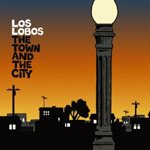There’s something very appealing – and to be immediately mistrusted – about the standard critical narrative of Los Lobos, a band that attained heights of popularity by perseverance and hard work, held onto their relevance through pure musicianship and, at 30 years going, continue to refine with every release. Certainly they’ve overcome a series of challenges, from a near-pigeonholing as “the Mexican-American band” to being continually confused with Los Lonely Boys (a slip that, speaking candidly, makes me want to stab myself). A critical reader who was unfamiliar with the band's work could be forgiven for harboring skepticism over new praise -- especially given the well-documented ability of narrative to overpower content, throw it out of the ring, and step on its throat -- and particularly in cases where aging artists are credited with a “return to form” or with “their strongest work yet,” or anything along those lines.
It is with this expectation of skepticism in mind that I make the following statement: The Town and The City is the strongest, most focused work from Los Lobos yet. Moreover, in a year when national hysteria over immigration had begun boiling toward its present fever pitch, they made an album about the immigrant experience that crackles with feeling and relevance.
The Town and The City is located by a triptych of place-portraits. “The Valley” is an idyll from the perspective of a migrant farm worker, “The City” a breathless account of the splendor of urban America, and “The Town” a depiction of a poor neighborhood at dusk. These songs establish the feeling of movement and the allure and promise of what's beyond the horizon, as well as conjuring a faint hint of optimism to balance the darkness of many of the stories. Were it not for these establishing shots, the cynicism of “Don’t Ask Why” and the plain desperation of “Hold On” might come to dominate the record – and those themes aren't the point. This isn’t an album about hopelessness, only about hopes onto which, perhaps, too much is pinned. For example, the protagonist of the loping country-blues “Road to Gila Bend” is evidently leaving behind a whole life, but what comes across in the refrain (“Can they see me coming? Do they know I’m running?”) isn’t total resignation, but battered fight.
All of this sentiment would be wasted if it weren’t for solid songs. Fortunately, Los Lobos grasped the current fashion for artiness in rock and turned in not only a set of catchy songs, but some of their prettiest, noisiest, and most experimental. I confess that in the past, I’ve been bored by some of their more traditional output – I’m simply not of a generation that can easily appreciate classicist strains in rock. I am cynical about blues pentatonics and doubly so about such shibboleths as tasteful noodling and impeccable guitar tone. The Town and The City won me over with sparkling cascades of delay (“The Valley”), blustering fuzz (“The Road to Gila Bend”), shiny, dream-pop organ (the retro-soul gem “Little Things”), and a rainbow-colored sheen on everything (particularly on “Chuco’s Cumbia,” a snappy Latin number that stands as one of their most fun songs to date).
That the music is cast after the themes and subject matter of the lyrics further removes The Town and The City from typical classicist exercises. “Chuco’s Cumbia” is loaded with old Pachuco slang; “Hold On” is spare and dusty to match its strung-out subject; “The Town” is shaded with subdued, minor-key menace. Perez, Hidalgo, and Rosas evidently conceive of their songs as entire aesthetic experiences, which is a distinctly contemporary attitude when contrasted with other aged rockers, for whom subject matter is often treated like an afterthought – used either as an entry in an authenticity contest (hewing to the notion that the artist is always the subject), as a tedious formalist chore, or to make some cranky point with the full awareness that nobody is listening. Given the number of miles they’ve clocked, what's surprising about Los Lobos is the extent to which their songs continue to be treated as ends in themselves, rather than as exhibits in the case for the artist’s relevance.
The Law of Rock Band Averages says that the next thing Los Lobos release will probably be an unpardonable dud. Of course, the whole appeal of the hard-work-and-perseverance narrative is in the way it implies that duds are the product of laziness or of style beating out substance, and not of the inevitability that talent eventually runs out. However, even if that winds up being the case – that is, if this is Los Lobos’s final seminal statement – then they nevertheless deserve recognition as one of the longest running bands to defy the odds and remain in the stream of vital discourse.
